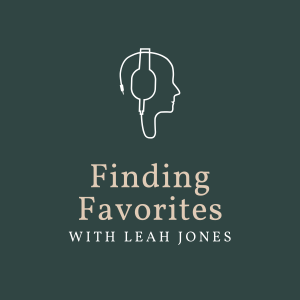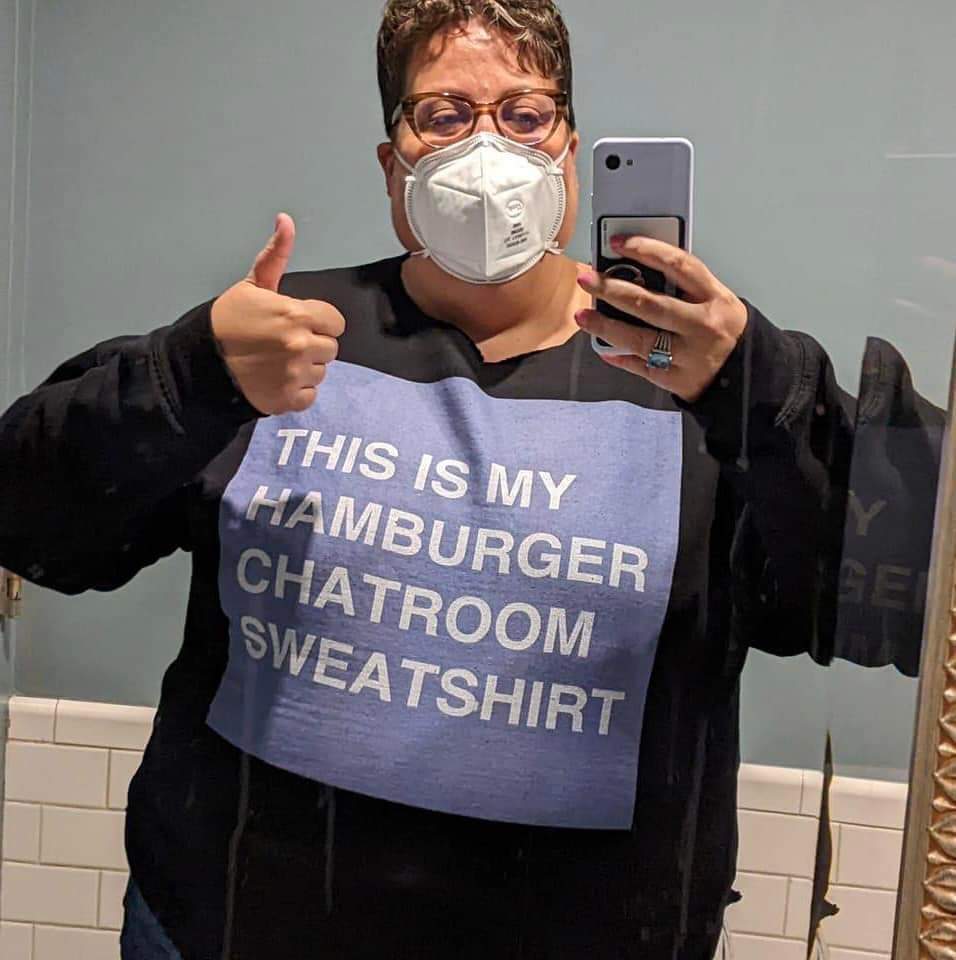Finding Favorites with Leah Jones
Finding Favorites is where we learn about people’s favorite things and get recommendations without using an algorithm. Every other week, host Leah Jones sits down with a guest to learn about how they found their favorite thing, why they love it and why they think other people will fall in love, too.
Finding Favorites is where we learn about people’s favorite things and get recommendations without using an algorithm. Every other week, host Leah Jones sits down with a guest to learn about how they found their favorite thing, why they love it and why they think other people will fall in love, too.
Episodes

Sunday Mar 26, 2023
Author Laurel Snyder tells the story of Jason Isbell and Amanda Shires
Sunday Mar 26, 2023
Sunday Mar 26, 2023
Laurel Snyder, an Atlanta-based author, joined Leah to talk about the music and marriage of Jason Isbell and Amanda Shires. From Jason's early career in the Drive By Truckers to current collaborations with his wife Amanda Shires, their music was the soundtrack to Laurel's pandemic life.
Laurel's new book The Witch of Woodland is available for pre-order now and is a perfect gift for tweens preparing to prepare for their b'nai mitzvah.
Keep up with Laurel on LaurelSnyder.com
Show Notes
Little Shop of Stories (order signed books)
https://18doors.org/
JasonIsbell.com
AmandaShiresMusic.com
Tiny Desk Concert
The Nashville Sound
Amanda Shires Youtube
Jason Isbell Instagram
Amanda Shires Instagram
Hope the High Road
Elephant
Something More than Free
Jeff Tweedy and Ezra Klein
The Triggering Town

Sunday Mar 19, 2023
Abby Stewart loves artist journals and queso
Sunday Mar 19, 2023
Sunday Mar 19, 2023
Abby Stewart, a Bay Area author, loves artists journals and queso. She joined Leah fresh from AWP in Seattle to talk about her new novel Foundations, writing and publishing during lockdown, and her love of diaries and journals written by artists. We also talk about the best ways to improve Velveeta queso dip.
Keep up with Abby online
HelloAbigailStewart.com
Twitter @abby_writes
Instagram @abby_cake
Whiskey Tit
The Drowned Woman
Foundations
Show Notes
AWP
Sunset Magazine
Piper Cub Forum: Leah Jones
Leah Jones (piper cub)
The Folded Clock
Daybook: The Journal of an Artist
Anne Truitt
Self Portrait by Celia Paul
No 91/92
Jenny Lawson
Diary of a Provincial lady
The Forbidden Notebook
My Faraway One (selected letters from Georgia O'Keefe)
What are hatch green chiles?
Queso Blanco with roasted corn
15 Veggies to mix into your queso

Sunday Mar 05, 2023
Candy Chat Chicago crossover event! Happy Birthday, Jocelyn!
Sunday Mar 05, 2023
Sunday Mar 05, 2023
Leah was sick with COVID this week, which meant no energy for new interviews. However, mountains of Candy Chat Chicago epsiodes were in the hopper waiting to be edited and it happens to be Jocelyn's birthday. So happy birthday Jocelyn, here is a crossover episode of Candy Chat Chicago!

Sunday Feb 26, 2023
Jesse Dukes loves the Three Musketeers
Sunday Feb 26, 2023
Sunday Feb 26, 2023
Jesse Dukes, co-host of the podcast Upper Middlebrow, loves the Richard Lester movies from 1973 and 1974: The Three Musketeers and The Four Musketeers. We also talk about the Neal Stephenson deep dive on Upper Middlebrow.
Follow Jesse online
@CuriousDukes
UpperMiddlebrow.com
Show Notes
Blank Check Podcast
Strange Days
The Hunt for Red October
M3gan
Klara and the Sun
Her
Curious City
Three Musketeers
The Four Musketeers
Sword Stuff with Sean Ellis
Pirates of the Caribbean
After 3 years of successful pandemic mitigation, COVID has come home to roost. This episode is brought to you by Paxlovid, Advil and five pounds of cough drops

Sunday Feb 19, 2023
Cameron MacKenzie explores places that feel like home
Sunday Feb 19, 2023
Sunday Feb 19, 2023
Cameron MacKenzie returns to talk about places that feel like home that aren't home and we try to find the thread that connects Kamakura in Japan, The Nation in Washington DC, The Presidio and Washington Square Park in San Francisco, and Fergies Bar in Philadelphia.
CameronMacKenzie.org
Facebook
River Weather stories
Show Notes
The Nation in DC
Reddit thread - do you remember Nation Night Club?
That 90s Show - Rave
Trainspotting Soundtracks
Trainspotting on Blank Check with Griffin and David
Kamakura, Japan
Guide to Kamakura
Storytelling Traditions in Japan
How to deal with Culture Shock
Fergie's in Philly
Fergie's events
Live in the Presidio
Washington Square
Tony Niks
Durango Diner
Why Smells Trigger Such Vivid Memories

Sunday Feb 12, 2023
Marty Beckerman loves the gym, the 90s and being a dad
Sunday Feb 12, 2023
Sunday Feb 12, 2023
Marty Beckerman, an LA-based author, comedian and new dad, is on the podcast this week to celebrate the launch of his new book The Time Meowchine: A Talking Cat’s Y2K Quest to Save the World and talk about the 90s. The 1990s, that is. We talk about how he started going to the gym as a joke and accidentally got swole, legally being able to tell dad jokes, and the 1990s.
Keep up with Marty online and buy his books!
MartyBeckerman.com
MartyBeckerman.com/#books
The Time Meowchine: A Talking Cat’s Y2K Quest to Save the World
Show Links
What is a borg?
High and Mighty: Being Fat with Mike Mitchell
90s Con
9/11
Alternative Histories
Iraq War
Weapons of mass destruction
Man in the High Castle
Gore vs Bush debate, 2000

Sunday Feb 05, 2023
Lyndsey Little loves monsters of all sizes
Sunday Feb 05, 2023
Sunday Feb 05, 2023
Lyndsey Little, creator of OniGirl comic, joined Leah to talk about her love of monsters, the monster boarding school where her comic is set, and the best foods for nostalgia day!
Support Lyndsey's kickstarter to bring glorious color to OniGirl
Follow Lyndsey on Instagram and Tik Tok
Show Notes
Stories to Dismember podcast
Most Oreo Oreo
Godzilla Movie Monster Evolution
Biblically Accurate Angels
Rivkah Reyes on Friday Night Movie Podcast
Beauty and the Beast
Teenage Mutant Ninja Turtles
Frankenstein
The Blackcoat's Daughter

Sunday Jan 29, 2023
Movie Music Moments with Shai Korman
Sunday Jan 29, 2023
Sunday Jan 29, 2023
Shai Korman, co-host of the Friday Night Movie Podcast, is back and we are talking about music movie moments. Opening and closing credits, soundtracks, movies about bands and more.
https://www.frinightmovie.com/
Follow Shai on Twitter and Instagram
Show Notes
Signal Awards for Excellence
What Does It Eat
Bandcamp Fridays for 2023
The Wrong Cat Died
Monkees
The REM song inspired by the Monkees
The Commitments
That Thing You Do
That Thing You Do
When Harry Met Sally
Trainspotting
Her
Eurovision Song Contest
Onyx the Fortuitous and the Talisman of Souls
Peacemaker Opening Credits
My Best Friend's Wedding (opening credits)
Sholay (RRR closing credits)
Drew Carey Show - 5 o'clock
Buckaroo Bonzai (closing credits)
My Best Friend's Wedding (karaoke scene)
My Best Friend's Wedding (Restaurant singalong)
Reservoir Dogs (opening walk)
Lost & Found
lQUrljyCoimXdK9Z8cKu
lQUrljyCoimXdK9Z8cKu

Sunday Jan 22, 2023
Chelsea Stickle picked up embroidery
Sunday Jan 22, 2023
Sunday Jan 22, 2023
Author Chelsea Stickle picked up embroidery as a hobby to channel her rage and has been poking fabric with sharp needles ever since. You can order her newest chapbook Everything's Changing from Thirty West Publishing House - it is a collection of surreal micro-fiction and flash fiction rooted in the chaos of the last few years.
Follow Chelsea online
ChelseaStickle.com
Twitter @Chelsea_Stickle
Everything's Changing
AITA for falling apart at a dinner party
Show notes
Sashiko
Etsy @GrandmaBeWildin
Crochet a tiny fox
Cross stitch fabric
Morton Salt Spill in Chicago (2014)
Blackwork Embroidery
ADHD symptoms in women
Bias about ADHD leaves many women with a late diagnosis

Sunday Jan 15, 2023
Michael Shelley loves Nancy, NRBQ and good food.
Sunday Jan 15, 2023
Sunday Jan 15, 2023
Michael Shelly, a music maker and WFMU DJ, joined Leah to talk about a few of his favorite things including the music of NRBQ (New Rhythm and Blues Quartet), the classic comic strip Nancy, and eating good food on the road. We also chat about WFMU and how Michael met They Might Be Giants, which lead him to one show at Millikin in the 90s.
Keep up with Michael
Twitter @wfmumichael
WFMU Archives
WFMU
Juniper - She Steals Candy
Show Notes
Chirp Radio Chicago
NRBQ
NRBQ Wikipedia
Nick Lowe
Nancy
Ernie Bushmiller
Twitter accout of classic Nancy
RoadFood.com
Roadfood the book
Lou Mitchell’s in Chicago
Galatoires in NOLA
Zahav in Philly
Gallaghers New York Steak House
The Flat Five (Chicago musicians)

Finding Favorites with Leah Jones
Everyone loves something. A hobby, a musician, an artist, a book genre - everyone has a favorite thing and this is the podcast where we hear the stories.
How did you discover your favorite thing? What do you love about it? Who have you met through it? How would someone sample your favorite thing?
At Finding Favorites, we get recommendations without using an algorithm.
Hosted by Leah Jones










